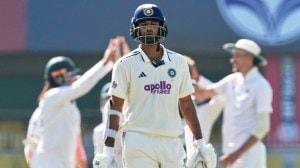Day after firing, Assam district tense
A day after seven persons were killed in two incidents of police firing, tension continued in the entire district of Goalpara in Lower Assam.

A day after seven persons were killed in two incidents of police firing, tension continued in the entire district of Goalpara in Lower Assam. An indefinite curfew, imposed immediately after the violence, continued on the second consecutive day in the Lakhipur police station area.
The Government had on Wednesday evening called the Army to contain the spread of violence. The Army staged a flag march at Lakhipur and Goalpara on Thursday, said officials in the state capital.
The police had to resort to firing, first to disperse irate mobs that tried to disrupt movement of polling personnel for the second round of panchayat elections and then to push back a bigger crowd that wanted to attack and set on fire the police station at Lakhipur on Wednesday. The crowds were instigated by the Non-Rabha Coordination Forum that was demanding holding of panchayat elections in those areas that fall under the Rabha Hasong Autonomous Council (RHAC) that are also part of Goalpara and Kamrup districts.
Meanwhile, the seven persons killed in the two incidents of police firing have been identified as Mahar Ali, Hasem Ali, Sirajul Haque, Rahim Badshah, Firoze Ali, Hasmat Ali and Tahin Ali. While the first three were killed in the firing that took place in the Lakhipur bazaar, the remaining five died in the second incident hardly 100 metres away from the police station.
“The situation is tense, but under control,” Subhash Chandra Das, Principal Secretary (Home) told The Indian Express here on Thursday. Security forces have been directed to keep vigil in view of the cremation of the bodies, which were brought to Guwahati for post-mortem, he said.
The situation in Goalpara, one of the seven Muslim-majority districts of Assam, had turned tense in the middle of December when the state Government decided to “postpone” panchayat elections in the those panchayats that fell under the Rabha Hasong Autonomous Council (RHAC). It was postponed in view of demand by organisations representing the Rabha tribe that has been pressing for Sixth Schedule status under the Constitution as enjoyed by the Bodo tribals.
But even as the panchayat elections were postponed, it were the non-Rabha communities, more prominently a section of the Muslim population that protested, saying the elections were postponed at the cost of their right to exercise franchise. They also formed what was named the Non-Rabha Coordination Forum, which began a series of agitations that led to Wednesday’s flare-up when the demonstrators turned violent.
“Wednesday’s attack on police officers and poll personnel and the attempt on the police station were part of a well-planned design to create a situation,” a senior police officer said on condition of anonymity. “Some elements even tried to ignite a communal violence,” he said, pointing out that seven houses belonging to a linguistic minority were set on fire by the mob as it swelled up and began marching with lethal weapons towards the police station at Lakhipur.



- 01
- 02
- 03
- 04
- 05




























